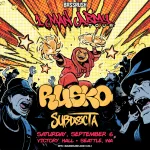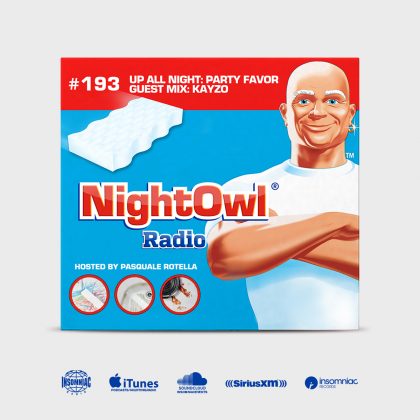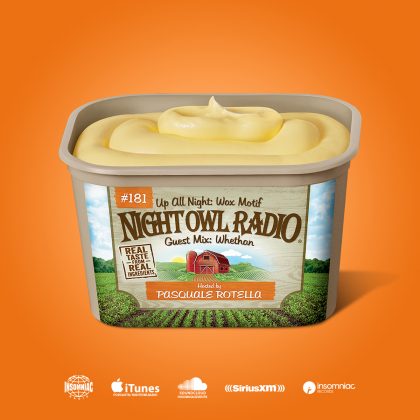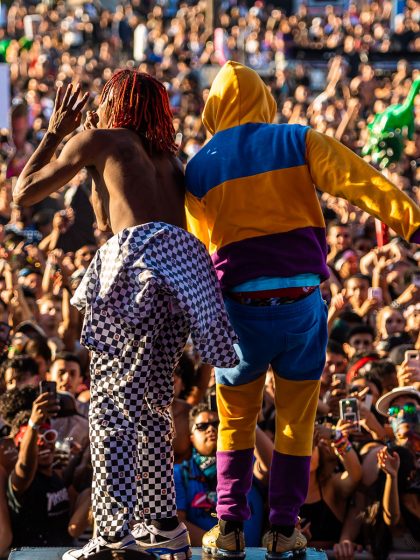Pasquale Catches up With Caspa and Rusko After 6 Years of Studio Silence
Upcoming Event
It’s been six years since Caspa and Rusko have gone quiet on the collab front. But all of that is changing now, as the UK tandem have officially broken their studio silence. Anyone with the slightest knowledge about dubstep would be able to tell you how fundamental these two figures were in laying down the framework for the genre. They worked tirelessly to bludgeon bassheads via countless co-credited tracks and blistering b2b sets. And nothing makes us happier to see them back in business.
“When you’ve been away that long and the spark is there straightaway, that’s special.”
Pasquale Rotella wrangled the low-end light bearers together for Night Owl Radio 008, to catch up before they went blow-for-blow onstage during their mental Bassrush reunion (their only confirmed date at this juncture). If you tuned in, you heard them rap with our CEOwl and peeped the exclusive premiere of their new joint production, “Blouses & Skirts.” But here’s the rest of the interview you didn’t hear online.

Caspa and Rusko: Thanks for having us.
And for the first time ever, we have a dog on Night Owl Radio. What’s his name?
R: Wiley.
Wiley is in the house.
C: Not the grime Wiley, though. [Laughs]
R: No, not the grime Wiley. I’ve been away in the UK for six months, and I just got back today and haven’t seen my little puppy for a long time. So he’s gonna follow me everywhere.
What kind of dog is it?
R: He’s a chorkie: a Chihuahua/Yorkie mix.
I love that you’re traveling with a dog, man. I’ve been doing this a long time, and I’ve never seen that before. [Laughs]
C: He rolls on the tour bus—no worries.
I look at you guys as the originators of the dubstep sound—OGs, for sure. You were the first names I heard when dubstep hit America. We were always trying to book you guys. Things have changed a lot since those early days. It’s been like seven years since you guys have been apart, and you’re collaborating again. What brought that together?
R: It all started out when I took six months off—no gigs—and decided to go back to the UK and catch up with my family and spend a few weeks out there. A few weeks turned into six months, but while I was out there, I hit Caspa up and was like, “Yo, we should get in the studio while I’m over for a day or two and see what happens.” That two-day session brought forth two tunes, and then the next week we got together and did another two days, and it kind of spiraled out of control. [Laughs]
C: And the timing. We both took time off at the same time.
R: That’s exactly right. Without any knowledge of each other doing it, we’d both taken a lot of time off from gigging to get back in the studio and get refreshed and do something slightly different.
C: Man, I tell you what. The first day in the studio, it was like we never left. When you’ve been away that long and the spark is there straightaway, that’s special. I don’t know why we hadn’t done it. It’s not because we didn’t want to do it. We’d just been too busy, individually. But nothing before its time, right?
I love that it wasn’t a strategic business plan. You guys are just homies and had time, and it organically came together.
C: People are gonna think that it’s like, “Okay, maybe it’s slowed down for you guys and you’re going to come together,” but it’s not even that. It’s just right, and it feels good, and the energy is good. If we’d gotten in the studio and the energy was wrong and we were both clashing, we wouldn’t be sitting here with you. It’s just working. When something works so well and so organically, why try and go against that?
R: Until we’d left a couple of days ago, we were still putting in those weekly sessions, knocking out a new track every week. It’s continuing. There’s no, “Oh, we’ve got an album’s worth” or “There’s a single” or whatever. There’s no end in sight at the moment. It’s just going to be a continuous thing. For me, the gig is just letting everybody know that we’re back, and making everybody aware of what we’ve been doing in the studio.
“It’s all about the music, and without the good music, there’s nothing.”
I can tell you firsthand that people are hyped. Is this the only date for right now?
R: Yup, this is all there is in the calendar.
C: You know what it is? People come together like this, and then it’s like, “Okay, let’s do a single, then let’s do another single, then do the tour.” We were both like, “Let’s just go back and make music, and if the music is good, we put it out. If it’s not good, it stays on the hard drive.” We’re just gonna go back to basics and do how we done it back in the day. When it’s ready, it goes. If we do a tour, then we do a tour. If we don’t, then it’s just one show in L.A., that’s it. I think that way there’s no pressure, and you take it back to what it’s all about—why you’re sitting here, why we’re sitting here. It’s all about the music, and without the good music, there’s nothing. That’s the foundation for me, and [Rusko] felt the same. That’s how we want to play it.
R: That’s why we both took the time off—to refocus.
C: Being in the studio for seven years—and touring for eight, nine, 10 years—you don’t get the chance to go in the studio and open that plugin for six or seven hours and see what comes out. You’re normally like, “I need to finish this remix!” He wanted to do the same thing—just get in the studio and have fun again. I felt like when we had fun in the early days, so much cool stuff came out because there was no pressure. The only pressure we had was the pressure we’d put on ourselves.
Stress affects creativity, straight up. For you guys to be able to shake all your business opportunities off or put them on hold, that’s a beautiful thing, and people are feeling it. Now, you might have been asked this before, but I don’t know this, and a lot of the listeners don’t know this: What are your roots, musically?
C: Being from London, dance music is standard in your blood. Jungle, hardcore, house music—we had that from the get-go. For me, it was always there. My older brother was a record collector and used to collect funk and hip-hop and jazz and broken beat, and then my dad was way into his punk. There was always music in the family, but me personally, I never come from music. I can’t play any instruments. I used to play sports. Basketball was my thing. I was a captain for England, and I had a scholarship to a high school to play point guard. When I dislocated my shoulder, my second love was always music. I’d pick up some vinyl and spin it and see where it goes. For me, that’s how I got into the music. Then I started making the music to get bookings and swap tunes with people.
Most of the good dance music was coming out of the UK when I was raving and going to warehouse parties here in L.A. It was a dream of mine to go to London and rave. I finally got to do it in ‘92, and it was unbelievable. Things shifted, though.
C: For me, it’s always the progression. House music had come over from Chicago and Detroit, and then we had our own take on it, and then it just rolled. You felt like it went acid, hardcore, jungle, drum & bass, UK garage, grime and dubstep. It’s the evolution of the UK sound, and we was just on that trek.
R: That timeline there was spot on.
C: We was just the next page in the book of UK dance.
How did you guys originally connect?
C: Through me hearing some demos and stuff of [Rusko’s].
R: Caspa was doing a radio show on Rinse FM called Quiet Storm, his original DJ name, and I got his MSN address and MSN’d some demos of some dub tracks that I’d been doing—more straight reggae dub, rather than dubstep. He hit me back on Messenger, and we just chatted away. He played a couple of my tunes on his radio show, and it just worked from there, really. Then we hung out and tried to make a track together. We were both fans of each other’s music, but it was very old-school. Hitting a DJ up from a pirate radio on MSN Messenger and sending him some MP3s—a bit cliché, really. [Laughs]
One more thing I wanted to ask: Rusko, I know you dabble with drum & bass.
R: Yes.
Caspa, do you?
C: I love D&B, but I don’t necessarily play it in my sets that much. But you know what it is? Drum & bass is foundation music for us. When we listen to it, it doesn’t matter what we make or what we do; we can be on the dancefloor with everyone else, because that’s what we love. Being from the UK, it’s just in your blood.
Drum & bass started in the UK underground.
C: I feel like the only advantage we had [in dubstep] over drum & bass is that when we came around, the internet was just about to pop—Myspace and all that kinda stuff. That’s what gave dubstep the leverage to go worldwide so much quicker than drum & bass. If drum & bass had the internet when it did, it would have been that. When did Myspace really start popping? It was around 2004, 2005. Then social media started coming around really heavy in 2009, 2010. It was accessible to anyone. You didn’t have to be at drum & bass nights. You could just sit indoors and go online and listen to all the best new tunes. Or I’m going to lock into Kool FM because I can listen to it on the internet, or tune into rinse FM or whatever stations are streaming pirate radio. Now they’re streaming worldwide. You could only listen to Kool FM in London in a certain radius. But some people in America were locked into Kool FM online. We were just part of the evolution, but we just had an advantage.
Follow Pasquale Rotella on Facebook | Twitter
Follow Caspa on Facebook | SoundCloud
Follow Rusko on Facebook | Twitter | SoundCloud







